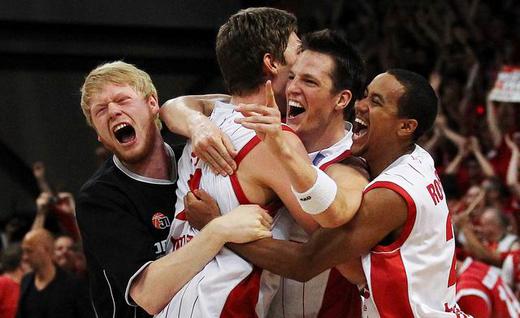
Source: np-coburg.de
Every year, companies spend a massive amount of money on teambuilding activities. They let their people jump off trees, raft in wild waters, and party together at the end of the day in fancy locations.
But – what about the long-term effect of these teambuilding activities? Is there a long-term impact at all?
I talk a lot to HR representatives about the impact of classical teambuilding events. It’s not surprising that these are said to create more a short-term impulse than a lasting effect.
While in the business world good team spirit is important, in the world of team sports it’s essential for survival. In team sports you win together and you lose together. No team, no win.
Learning from professional team sport
At a recent event I heard Chris Fleming, head coach of the leading German basketball team Brose Baskets, talk about their four elements of teambuilding.
From my point of view, businesses can learn from pro teams like the Brose Baskets.
1st element: HUDDLE
According to dictionary.com a huddle is a a closely gathered group, mass, or heap; bunch. In basketball players come together and huddle countless times during a game. They exchange opinions, discuss the next move, address weaknesses.
One of my clients from the online gaming sector has established a regular “huddle” for all team members. Every Monday morning at 9:30am more than 300 people come together and listen to the latest developments presented by leadership and other team members.
How do you huddle in your company?
2nd element: HUSTLE
Every time a player of the Brose Baskets ends up in a hustle, a competitive struggle, he walks the extra mile for the team. He doesn’t fight for himself, but for the team. At the Brose Bakets these hustles are acknowledged and applauded.
Volunteering for special projects, developing ideas for process improvement, speaking at a conference – how do you acknowledge and applaud team members who walk the extra mile for the team?
If hustlers feel that their hustles aren’t recognized by their team, they stop hustling. Public acknowledgment can beat the most complex bonus system.
3rd element: HELP-UPS
Whenever a player of the Brose Baskets falls down, right away several team members help him up back on his feet. According to Chris Fleming this is an important symbolic act which shows the fallen player that he still belongs to the team.
When your colleagues fall, when they make a mistake, how do you help them up? Do you offer constructive support or do you talk badly about the incident during the coffee break?
You don’t build a team by jumping off trees once a year. You build a team by helping up your team members every time they fall.
4th element: BENCH ENERGY
For me, the most fascinating element of teambuilding at the Brose Baskets is what Fleming calls “bench energy”. He explained that there are two categories of substitute players. The first group consists of players who cheer up their team-mates on the field. They are enthusiastic and celebrate every great move of their team. These substitute players exude positive energy on the bench. When they enter the game, they are well integrated from the beginning.
Then, you have the second group. Players who are expressionless. Arms crossed. Looking bored. They just wait for their chance to show the rest of the world that they are the ones who should be in the starting team. They exude no positive energy at all.
Who of these two groups do you want to sit on your company’s “bench”? Envious, badmouthing and negative people on the “bench” are team destructors. Identify those substitute players and substitute them!
Teambuilding rituals for your company
Huddles, hustle, help-ups, bench energy – these are the four elements of teambuilding applied by the supremely successful Brose Baskets.
Consider these and other rituals for your company. Your HR department might ask for better bonus systems or an additional budget for wild water rafting, but your team wants huddles, hustle, help-ups, and bench energy!
And the best thing? They are for free.
